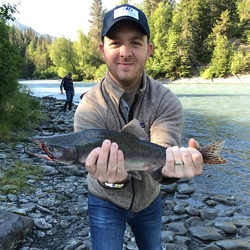Carnery Row Cellar
Flora Springs
Trilogy Napa Valley Cabernet Sauvignon Blend 2011
A bottle that holds a lot of sentimental meaning, this was the first “nice” bottle of wine my wife and I bought together shortly after we got engaged in 2015. We went to Napa a few days later and attended the Flora Springs Trilogy release party (which we ended up doing 6 times in a row). While iced-in here in TX this week, we decided to open this bottle that we’ve had for almost 8yrs exactly to the day. One of the things I love about wine is the ability to attach memories to bottles!
Right off the bat, this is classical 2011 Napa. It has a distinct green streak down the middle of the palate. Flora Springs was able to get the fruit semi-ripe which balanced out the lean and mean acidity. I have no qualms with 2011 Napa (and have found some to be absolutely incredible). I can appreciate a wine that speaks to the vintage, like this one. At roughly 12yrs, this is integrated. Oak is in the background, with cherry pipe tobacco, cherry cordial and underripe blackberries. Smooth and light bodied on the palate. Not getting any better, I suggest enjoying now. — 3 years ago
Cannery Row
California Chardonnay 2019
Very nice! — 4 years ago
Sokol Blosser
Twelve Row Block Estate Pinot Noir
2017. Very smooth from the first glass to the last. — 6 years ago
Weingut Keller
Abts E de Riesling 2017
One of the best evenings of wine I’ve had this year, and it was just focused on this duo. Opened as inspiration for this year’s red pick at Miao Lu (a name to remember for those reading. I’ll say it here first - some of the best Pinot’s and Chard’s in the world will be coming out of this project high up in Yunnan!), and they both gave great context to the task.
When I harvested with Klaus-Peter in 2017, the vineyards bore the scars of hail, every last one of them. The damage was manifest in what we came to call "hail berries" (misshapen berries). To my untrained palate, they tasted perfectly fine. Naturally, I asked KP why we were discarding them, and his response, while not entirely unexpected, was still astonishing (paraphrasing of course): "I don't need to know precisely what they do," he said, "but if there's even a chance they might diminish the wine by 1%, they're gone. And these? They look capable of much worse."
That unyielding spirit of his was, I must admit, my torment at Abtserde, the vineyard hit hardest by the hail. We spent an entire day sorting and picking a single row - granted, the rows were long, but the pace was glacial. The true enemy, though, wasn’t the relentless sorting, but the wasps. Those little demons made an already grueling task even more daunting, dodging their stings as we plucked berries one by one, like selecting pearls from a troubled sea. What we ended up with were, quite literally, tiny gems - "caviar" berries of purity. By day’s end, the sight was something to behold. Despite the torment, the hard work was unquestionably worth it. The 17’ Abtserde is my wine of the vintage.
I’ve had the 17’ Abtserde on numerous occasions but this takes the cake as the best (note to self: best to decant a young Abtserde hard). It is a marvel of purity and depth, with its nose evoking Meyer lemon, iodine, chalk, and flint. These aromas reappear on the palate with a nearly overwhelming intensity, blending piquant brightness and mineral-rich concentration. With more air, a floral, bittersweet herbal note very typical of the vineyard appears (smells like the place even). As the evening unfolded, the wine seemed to grow younger, each glass more lively than the last. The final sip was almost painfully austere, like drinking pure limestone, its explosive palate held together by sharp acidity and a palpable, phenolic grip. The finish seemed endless. One of my best Keller experiences this year. — a year ago
Bella Vida
Proprietor's Cuvé Two Row Cuvee Pinot Noir 2015
2015 drunk in 2021. Nutmeg, vanilla, and blackberry nose. Cherry cola mid-palette, hint of wet tea leaves on finish. Great backbone. — 4 years ago
Pezzi King
Row 14 Reserve Zinfandel 2012
Spectacular, aging brilliantly. Deep flavor, bright fruit. — 2 years ago
Cayuse Vineyards
Edith Grenache Rosé 2018
My last of a 3-pack. The fruit is from the Armada Vineyard in a special two row section that is used solely for rosé.
Compared to the 2017 I had in 2020, I found this to be more mellow (not sure if it is due to vintage or the fact that this has almost four years of age compared to when I had the 2017 it had three years of age). Much more pale pink and extremely Provençal. Watermelon rind, cantaloupe and a very mineral driven aromatic profile. Not as tangy/iron driven as the 2017 I had, but the acidity seems brighter. Rose petals, black cherry skin and dragonfruit on the palate with more stony/mineral notes. No way anyone takes this to WA state (let alone Cayuse). Incredibly French. I’d consume in the next year or two, but certainly has the bones to hold on for a bit — 4 years ago
Checkerboard Vineyards
Kings Row Napa Valley Cabernet Sauvignon Blend 2015
Deep garnet. Oak and dark fruit on the nose. Hour decant and still a bit tight but yet still very smooth and well structured. Red and black fruit. Tannins silky smooth with nice long finish. Beautiful wine! After another hour this wine was hitting its stride! So good!! — 4 years ago
Saracina
Skid Row Vineyard Malbec 2018
Really great taste, mild yet flavorful. — 5 years ago





Chad Puckett
Very sweet. Challenging after taste but solid — 4 months ago